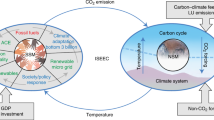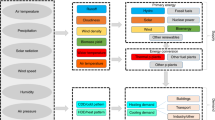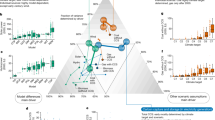Abstract
The linked problems of energy sustainability and climate change are among the most complex and daunting facing humanity at the start of the twenty-first century. This joint Nature Energy and Nature Climate Change Collection illustrates how understanding and addressing these problems will require an integrated science of coupled human and natural systems; including technological systems, but also extending well beyond the domain of engineering or even economics. It demonstrates the value of replacing the stylized assumptions about human behaviour that are common in policy analysis, with ones based on data-driven science. We draw from and engage articles in the Collection to identify key contributions to understanding non-technological factors connecting economic activity and greenhouse gas emissions, describe a multi-dimensional space of human action on climate and energy issues, and illustrate key themes, dimensions and contributions towards fundamental understanding and informed decision making.
This is a preview of subscription content, access via your institution
Access options
Subscribe to this journal
Receive 12 print issues and online access
$209.00 per year
only $17.42 per issue
Buy this article
- Purchase on Springer Link
- Instant access to full article PDF
Prices may be subject to local taxes which are calculated during checkout

Similar content being viewed by others
References
Crutzen, P. J. & Stoermer, E. F. The 'Anthropocene'. Global Change Newsletter 41, 17–18 (2000).
IPCC Climate Change 2013: The Physical Science Basis (eds Stocker, T. F. et al.) (Cambridge Univ. Press, 2014.).
Climate Change: Evidence and Causes (The Royal Society and the US National Academy of Science, 2014).
Climate Stabilization Targets: Emissions, Concentrations, and Impacts for Decades to Millennia (US National Research Council, 2011).
Levy, M. A. & Morel, A. C. in Global Environmental Outlook 5 (eds Ullstein, B. et al.) 3–30 (UNEP, 2012).
Rosa, E. A. & Dietz, T. Human drivers of national greenhouse-gas emissions. Nature Clim. Change 2, 581–586 (2012).
Dietz, T. & Rosa, E. A. Rethinking the environmental impacts of population, affluence and technology. Human Ecol. Rev. 1, 277–300 (1994).
Raupach, M. R. et al. Global and regional drivers of accelerating CO2 emissions. Proc. Natl Acad. Sci. USA 104, 10288–10293 (2007).
What is Social Science? (ESRC, 2013); http://www.esrc.ac.uk/about-us/what-is-social-science
Rosa, E. A., Rudel, T. K., York, R., Jorgenson, A. K. & Dietz, T. in Climate Change and Society: Sociological Perspectives (eds Dunlap, R. E. & Brulle, R.) 32–60 (Oxford Univ. Press, 2015).
York, R., Rosa, E. A. & Dietz, T. Bridging environmental science with environmental policy: plasticity of population, affluence and technology. Social Sci. Quart. 83, 18–34 (2002).
Allen, S. et al. Measuring household energy efficiency behaviors with attention to behavioral plasticity in the United States Energy Res. Soc. Sci. 10, 133–140 (2015).
Jorgenson, A. K. & Clark, B. Assessing the temporal stability of the population/ environment relationship in comparative perspective: a cross-national panel study of carbon dioxide emissions, 1960–2005. Pop. Environ. 32, 27–41 (2010).
Bryant, J. Theories of fertility decline and the evidence from development indicators. Popul. Dev. Rev. 33, 101–127 (2007).
Coale, A. J. & Hoover, E. M. Population Growth and Economic Development in Low-Income Countries (Princeton Univ. Press, 1958).
Dixon-Muller, R. Population Policy & Women's Rights: Transforming Reproductive Choice (Praeger, 1993).
Population and the American Future (The Center for Research and Population Security, 1972).
US National Academy of Sciences Rapid Population Growth: Consequences and Policy Implications (Johns Hopkins Univ. Press, 1971).
Jorgenson, A. K. & Clark, B. Are the economy and the environment decoupling? A comparative international study, 1960–2005. Am. J. Sociol. 118, 1–44 (2012).
Stiglitz, J., Sen, A. & Fitoussi, J.-P. The Measurement of Economic Performance and Social Progress Revisited. Commission on the Measurement of Economic Performance and Social Progress (OFCE, 2009).
York, R. Asymmetric effects of economic growth and decline on CO2 emissions. Nature Clim. Change 2, 762–764 (2012).
Jorgenson, A. K. Economic development and the carbon intensity of human well-being. Nature Clim. Change 4, 186–189 (2014).
Stern, P. C. et al. Opportunities and insights for reducing fossil fuel consumption by households and organizations. Nature Energy http://dx.doi.org/10.1038/nenergy.2016.43 (2016).
Coe, N. M., Dicken, P. & Hess, M. Global production networks — debates and challenges. J. Econ. Geogr. 8, 267–269 (2008).
Hess, M. & Yueng, H. W. C. Whither global production networks in economic geography? Past, Present, and Future. Environ. Plann. A 38, 1193–1204 (2006).
Vandenbergh, M. P. Private environmental governance. Cornell Law Rev. 99, 129–199 (2013).
Coe, N. M., Hess, M., Yueng, H. W. C., Dicken, P. & Henderson, J. 'Globalizing' regional development: a global production networks perspective. Trans. Inst. Br. Geogr. 29, 468–484 (2004).
Henderson, J., Dicken, M., Coe, N. M. & Yueng, H. W. C. Global production networks and the analysis of economic development. Rev. Int. Pol. Econ. 9, 436–464 (2002).
Bridge, G. Global production networks and the extractive sector: governing resource-based development. J. Econ. Geogr. 8, 389–419 (2008).
Jorgenson, A. K. & Givens, J. in The Routledge International Handbook of Social and Environmental Change (eds Lockie, S., Sonnenfeld, D. A. & Fisher, D.) 31–44 (Routledge, 2014).
Jorgenson, A. K. The sociology of ecologically unequal exchange and carbon dioxide emissions, 1960–2005. Social Sci. Res. 41, 242–252 (2012).
Pacala, S. & Socolow, R. Stabilization wedges: solving the climate problem for the next 50 years with current technologies. Science 305, 968–972 (2004).
Stokes, D. E. Pasteur's Quadrant: Basic Science and Technological Innovation (Brookings Institution, 1997).
Castree, N. et al. Changing the intellectual climate. Nature Clim. Change 4, 763–768 (2014).
Allcott, H. & Mullainathan, S. Behavior and energy policy. Science 327, 1204–1205 (2010).
US National Research Council Advancing the Science of Climate Change (National Academies, 2010).
Brandt, P. et al. A review of transdisciplinary research in sustainability science. Ecol. Econ. 92, 1–15 (2013).
Goldblatt, D. L. et al. (eds) Tackling Long-Term Global Energy Problems: The Contribution of Social Science (Springer, 2012).
US National Research Council Restructuring Federal Climate Research to Meet the challenges of Climate Change (National Academies, 2009).
Sovacool, B. K. Diversity: Energy studies need social science. Nature 511, 529–530 (2014).
Sovacool, B. K. What are we doing here? Analyzing fifteen years of energy scholarship and proposing a social science research agenda. Energy Res. Social Sci. 1, 1–29 (2014).
Liu, J. et al. Complexity of coupled human and natural systems. Science 317, 1513–1516 (2007).
Stern, P. C. A second environmental science: human-environment interactions. Science 260, 1897–1899 (1993).
Kates, R. W. et al. Sustainability science. Science 292, 641–642 (2001).
Rosa, E. A. & Machlis, G. E. Energetic theories of society: an evaluative review. Sociol. Inq. 53, 152–178 (1983).
Mazur, A. & Rosa, E. A. Energy and life-style: massive energy consumption may not be necessary to maintain current living standards in America. Science 186, 607–610 (1974).
Jorgenson, A. K. Economic development and the carbon intensity of human well-being. Nature Clim. Change 4, 186–189 (2014).
Steinberger, J. K., Roberts, J. T., Peters, G. P. & Baiocchi, G. Pathways of human development and carbon emissions embodied in trade. Nature Clim. Change 2, 81–85 (2012).
Dietz, T., Rosa, E. A. & York, R. Environmentally efficient well-being: rethinking sustainability as the relationship between human well-being and environmental impacts. Human Ecol. Rev. 16, 113–122 (2009).
Cramer, J. C. et al. Structural-behavioral determinants of residential energy use: summer electricity use in Davis. Energy 9, 207–216 (1984).
Kempton, W., Harris, C., Keith, J. & Weihl, J. Do customers know 'what works' in energy conservation? Marriage Fam. Rev. 9, 115–133 (1985).
US National Research Council Energy Use: The Human Dimension (eds Stern, P. C. & Aronson, E.) (WH Freeman, 1984).
Vine, E. L. Solarizing America: The Davis Experience (Conference on Alternative State and Local Policies, Energy Project, 1981).
US National Research Council Global Environmental Change: Understanding the Human Dimensions (eds Stern, P. C., Young, O. R. & Druckman, D.)(National Academy, 1992).
US National Research Council Adapting to the Impacts of Climate Change (National Academies, 2010).
Hess, D. J., Mai, Q. D. & Brown, K. P. Red states, green laws: ideology and renewable energy legislation in the United States. Energy Res. Soc. Sci. 11, 19–28 (2016).
Fischhoff, B. The realities of risk-cost-benefit analysis. Science 350, 527 (2015).
Klinke, A. & Renn, O. Systemic risks as challenge for policy making in risk governance. Qual. Soc. Res. 7, 33 (2006).
Sidortsov, R. Reinventing rules for environmental risk governance in the energy sector. Energy Res. Soc. Sci. 1, 171–182 (2014).
Sovacool, B. K. & Saunders, H. Competing policy packages and the complexity of energy security. Energy 67, 641–651 (2014).
Wong-Parodi, G., Krishnamurti, T., Davis, A., Schwartz, D. & Fischoff, B. A decision science approach for integrating social science in climate and energy solutions. Nature Clim. Change http://dx.doi.org/10.1038/nclimate2917 (2016).
Sovacool, B. K., Heffron, R. J., McCauley, D. & Goldthau, A. Energy decisions reframed as justice and ethical concerns. Nature Energy http://dx.doi.org/10.1038/nenergy.2016.24 (2016).
Bidwell, D. Thinking through participation in renewable energy decisions. Nature Energy http://dx.doi.org/10.1038/nenergy.2016.51 (2016).
Dietz, T., Rosa, E. A. & York, R in Human Footprints on the Global Environment: Threats to Sustainability (eds Rosa, E. A., Diekmann, A., Dietz, T. & Jaeger, C.) 83–134 (MIT Press, 2010).
Henry, A. D. & Vollan, B. Networks and the challenge of sustainable development. Annu. Rev. Environ. Resour. 39, 583–610 (2014).
Frank, K. A. in Social Networks and Natural Resource Management: Uncovering the Social Fabric of Environmental Governance (eds Bodin, Ö. & Prell, C.) 180–205 (Cambridge Univ. Press, 2011).
McCright, A. M., Dunlap, R. E. & Marquart-Pyatt, S. T. Environ. Pol. 25, 338–358 (2016).
US National Research Council Public Participation in Environmental Assessment and Decision Making (eds Stern, P. C. & Dietz, T.) (National Academies, 2008).
Schot, J., Kanger, L. & Verbong, G. The roles of users in shaping transitions to new energy systems. Nature Energy http://dx.doi.org/10.1038/nenergy.2016.54 (2016).
Shwom, R. L. A middle range theorization of energy politics: the US struggle for energy efficient appliances. Environ. Pol. 20, 705–726 (2011).
Prakash, A. & Potoski, M. (eds) The Voluntary Environmentalists: Green Clubs, ISO 14001, and Voluntary Environmental Regulations (Cambridge Univ. Press, 2006).
Vandenbergh, M. P. & Gilligan, J. M. Beyond gridlock. Columbia Environ. Law J. 40, 217–303 (2015).
Hensel, N. D. in New Security Frontiers: Critical Energy and the Resource Challenge (ed. Krishna-Hensel, S. F.) 113–138 (Ashgate, 2012).
Haas, R. et al. How to promote renewable energy systems successfully and effectively Energy Pol. 32, 833–839 (2004).
Loiter, J. M. & Nornerg-Bohm, V. Technology policy and renewable energy: public roles in the development of new energy technologies. Energy Pol. 27, 85–97 (1999).
Espey, S. Renewables portfolio standard: a means for trade with electricity from renewable energy sources? Energy Pol. 29, 557–566 (2001).
Ostrom, E. Polycentric systems for coping with collective action and global environmental change. Glob. Environ. Change 20, 550–557 (2010).
Shewmake, S., Cohen, M. A., Stern, P. C. & Vandenbergh, M. P. Carbon triage: a strategy for developing a viable carbon labeling system. SSRN http://dx.doi.org/10.2139/ssrn.2353919 (2013).
Steen-Olsen, K. & Hertwich, E. G. in Handbook of Research on Sustainable Consumption (eds Reisch, L. A. & Thøgersen, J.) 131–144 (Edward Elgar, 2015).
Dietz, T., Ostrom, E. & Stern, P. C. The struggle to govern the commons. Science 302, 1907–1912 (2003).
Victor, D. G. & Keohane, R. O. Cooperation and discord in global climate policy. Nature Clim. Change http://dx.doi.org/10.1038/nclimate2937 (2016).
Rai, V. & Henry, A. D. Agent-based modelling of consumer energy choices. Nature Clim. Change http://dx.doi.org/10.1038/nclimate2967 (2016).
Geels, F. W., Berkhout, F. & van Vuuren, D. P. Bridging analytical approaches for low-carbon transitions Nature Clim. Change http://dx.doi.org/10.1038/nclimate2980 (2016).
Stern, P. C. Individual and household interactions with energy systems: toward integrated understanding. Energy Res. Soc. Sci. 1, 41–48 (2014).
Deline, M. B. Energizing organizational research: advancing the energy field with group concepts and theories. Energy Res. Soc. Sci. 8, 207–221 (2015).
York, R. Do alternative energy sources displace fossil fuels? Nature Clim. Change 2, 441–443 (2012).
International Energy Agency World Energy Outlook (OECD, 2012).
Evans-Pritchard, A. Oil and gas investment in the US has soared to $200b. Daily Telegraph (10 July 2014).
International Energy Agency Special Report: World Energy Investment Outlook (OECD, 2014); http://go.nature.com/4LGDHo
Stern, P. C. Contributions of psychology to limiting climate change. Am. Psychol. 66, 303–314 (2011).
The White House Executive Order — Using Behavioral Science Insights to Better Serve the American People (Office of the Press Secretary, 2015); http://go.nature.com/Au6KIe
Dietz, T. Bringing values and deliberation to science communication. Proc. Natl Acad. Sci. USA 110, 14081–14087 (2013).
Sovacool, B. K., Brown, M. A. & Valentine, S. V. Fact and Fiction in Global Energy Policy: Fifteen Contentious Questions (John Hopkins Univ. Press, 2016).
Sovacool, B. K. et al. Integrating social science in energy research. Energy Res. Soc. Sci. 6, 95–99 (2015).
Spreng, D. Transdisciplinary energy research — reflecting the context. Energy Res. Soc. Sci. 1, 65–73 (2014).
Ostrom, E. Governing the Commons: The Evolution of Institutions for Collective Action (Cambridge Univ. Press, 1990).
Stern, P. C. Design principles for global commons: natural resources and emerging technologies. Int. J. Commons 5, 213–232 (2011).
Sovacool, B. K. Design principles for renewable energy programs in developing countries. Energy Environ. Sci. 5, 9157–9162 (2012).
Gaffigan, M. E. Advanced Energy Technologies: Budget Trends and Challenges for DOE's Energy R&D Program (US Government Accountability Office, 2008).
US National Research Council Climate and Social Stress: Implications for Security Analysis (eds Steinbruner, J. D., Stern, P. C. & Husbands, J. L.) (National Academies, 2013).
Renewables 2015 Global Status Report (REN21 Secretariat, 2015); http://www.ren21.net/wp-content/uploads/2015/07/REN12-GSR2015_Onlinebook_low1.pdf
Acknowledgements
Contributions from B. K. S. were supported in part by the Research Councils UK's (RCUK) Energy Programme Grant EP/K011790/1 and the Danish Council for Independent Research (DFF) Sapere Aude Grant 4182-00033B. Contributions by T. D. were supported in part by AgBioResearch of Michigan State University. Except as noted in the references, the views expressed in this paper are those of the authors and not of the National Acadamies of Sciences, Engineering and Medicine, nor of the RCUK Energy Programme or the DFF.
Author information
Authors and Affiliations
Corresponding author
Ethics declarations
Competing interests
The authors declare no competing financial interests.
Rights and permissions
About this article
Cite this article
Stern, P., Sovacool, B. & Dietz, T. Towards a science of climate and energy choices. Nature Clim Change 6, 547–555 (2016). https://doi.org/10.1038/nclimate3027
Received:
Accepted:
Published:
Issue Date:
DOI: https://doi.org/10.1038/nclimate3027
This article is cited by
-
Resilience of renewable power systems under climate risks
Nature Reviews Electrical Engineering (2024)
-
Abandoned wells multigeneration system: promising zero CO2 emission geothermal energy system
International Journal of Energy and Environmental Engineering (2022)
-
Holistic approach to assess co-benefits of local climate mitigation in a hot humid region of Australia
Scientific Reports (2020)
-
Quantifying the impacts of climate change and extreme climate events on energy systems
Nature Energy (2020)
-
Behavioral barriers and the energy efficiency gap: a survey of the literature
Journal of Industrial and Business Economics (2019)



